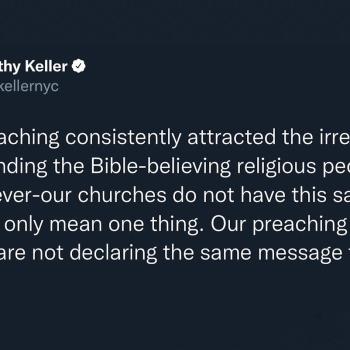 Image Source: This is Where I Draw the Line by Thomas Hawk; CC 2.0
Image Source: This is Where I Draw the Line by Thomas Hawk; CC 2.0
Over the past several years, I have had a lot of interactions and experiences with Christians from all over the theological board. Working at a Christian bookstore and being a socialite who loves to meet new people, I have met a number of brothers and sisters from different denominations. When I started studying theology for myself, I was astonished to realize that practically every doctrine I grew up believing as a Baptist had some fancy, academic name attached to it, but more so that there are, in most cases, multiple biblical views conflicting and complementing the ones to which I had always kept close.
Growing up, I was aware of the existence of different denominations and I remember understanding only vaguely how they differ from my mainstream Southern Baptist Church. One of my most memorable experiences with another denomination before I was in high school was when I went to my friend’s mega church one Sunday. I remember feeling a little uncomfortable with what I saw, simply because I had never experienced anything like it before. There was a coffee shop in the lobby, a small indoor jungle gym, and even a place to eat. Now my church wasn’t a necessarily small church (our membership was around 2000), but we didn’t have these extravagant luxuries.
Those luxuries aren’t necessarily denomination specific, but aside from the material differences I had noticed, there were some practices and activities that took place during the sermon that seemed strangely foreign to me. I would say most of us who were raised in a Christian household have experienced this at one time or another, and even new Christians can be shocked by the liturgical variety they find when church hunting.
For a majority of my spiritual walk, I had never given a second thought to the need for denominations in the Christian church. It wasn’t until the past couple of years that I started hearing a significant number of comments like “Oh, I’m just a Christian,” or “I just believe the Bible.” Without giving it too much thought, such comments seem harmless. In fact, if you find something wrong with them, you are often labeled as someone who wants to cause division among the body of Christ.
Many Christians nowadays follow this Non-denominational, unity-in-all-things mindset, but like all trends, it’s important for us to take a look at what it’s doing to our faith.
At the root of this issue, there are a growing number of individuals in the church (especially new Christians) who look at the vast number denominations and immediately think they are directly responsible for unnecessary division, and therefor must be a flawed church model. Most will then conclude that a church that is not affiliated with a denomination, creed, or catechism will have more unity and thus be more God-centered. Some make the argument against denominations, and in many cases systematic theology in general, that they tend to be based off of man’s beliefs (especially those denominations who hold closely to a creed, catechism, or are named after a founder), and therefore must also be flawed. Of course, these are typically the same people who spend their weeks reading from their Study Bibles, reading books by their favorite Christian authors, and going to church on Sunday to listen to their pastor preach, hardly ever questioning a word of what they say.
There is an extent to which I would definitely agree with the above argument; the word of man is never as authoritative as the word of God. Our canon is closed, and no human being can provide us with a revelation on the same level of scripture. Having said that, there is a reason churches follow teachings of influential figures in history. Sola Scriptura is not the same as Solo Scriptura.
God ordains men to shepherd his flock, and gives strict qualifications for those who do in 1 Timothy and Titus. This goes for preachers, elders, authors, and theologians. With this idea in mind, let’s take a look at Martin Luther. This man was a brilliant theologian who attempted to reform the Catholic Church. Any modern day protestant follows his teachings to one extent or another, because we believe his teachings are more biblical than the papist practices he worked so diligently to correct. Most people who actively follow the non-denominational mindset are the same people who will choose to divorce hundreds of years of church history in favor of their own private interpretation, which is one reasons these theological differences come up.
Many of us, if asked if we were Catholic, would respond with something like “No, I’m a Christian” or “I’m a protestant.” Why do we say this? Because we have significant disagreements with Catholic teachings and we don’t want to be identified with that particular body. Our beliefs line up much more with protestant teachings rather than Catholic ones, so we identify ourselves as Protestants.
This argument can even be taken to the larger picture. As human beings with sentient thoughts, different experiences, and different backgrounds, we have a mass variety of cultures, religions, and worldviews.
As Christians, we have fundamental disagreements with most of the world around us. In the western world, there is a large push for secularism liberalism and humanism, and as people who follow Jesus Christ we do not wish to associate ourselves with the secular culture and atheistic religious philosophy. Therefor, we call ourselves Christians, and rightly so. The term “Christian” is our way of saying we follow the whole Bible and believe there is only one truth, one way, one life.
This is the same philosophy that is important for us to hold amongst our Christian brothers and sisters. The unfortunate things is, God has given us a perfect manual for living (Psa 19:7) equipping us for every good work (2 Tim 3:16-17), but as sinners, no one man can interpret what is perfect perfectly all of the time. If we could, we would not have some 40,000 different sects of the Christian church.
For us Christians, it is our duty to learn God’s word and be constantly striving for a deeper knowledge of his attributes. Think of it like falling in love with another person. You cannot truly fall in love with someone until you get to know him or her on a deep and intimate level. Falling and staying in love with God require spending time with Him and studying His word to understand how He works. That’s why we have systematic theology. It is a way for us to understand more of God while recognizing we will never fully understand how He works.
Unfortunately and naturally, this in-depth doctrinal study often times leads to differences in interpretation. That is, essentially, why we have different denominations in the church. Differences in biblical interpretation can range anywhere from church government, salvation, the covenants, and practical issues. These are things that could, and often do, cause disunity if they are all represented in one ecclesiological church setting.
Non-denominational churches often times do not have a way of confessing their particular stances on secondary issues, which more often than not will cause confusion and will do more to prevent that deeper knowledge of God that we all must strive for. In many cases, those in non-denominational or interdenominational churches who do in fact begin to start having a deeper theological understanding of scripture find issues with the way their church is run or what is preached from the pulpit. Yet, there is not always a good way to address it because the church may not be confessional (meaning openly holding to certain doctrines or confessions), and once you start bringing theological labels into the mix to express your point, you immediately void the whole concept of non-confessionalism that, at the core, non-denominational churches hold to.
There are several non-denominational churches in my hometown that are very charismatic in nature. I have heard from numerous people who go to those churches that “they just believe the Bible,” or when asked about their denomination they respond with something like “I don’t have a denomination. If it’s not in the Bible, I don’t use it to identify myself.” I find this interesting, considering they have no problem calling themselves charismatics or Pentecostals, but refuse to use a denominational label. They will confess to their views on spiritual gifts and soteriology (study of salvation), and even their views on the end times (dispensational premillennialism, i.e., anything related to John Hagee, the Blood Moons hysteria, or the Left Behind series), but refuse to do so under the umbrella of a Pentecostal denomination. To sum it up, they have no problem following movements with labels, but not organizations with labels. Even so, despite what they may or not openly confess to, they call themselves Christians, which is not necessarily a biblical term either.
The term “Christian” did not come into the picture until a little more than a decade after Christ’s death. The label was not something the apostles or any churches used, because at that point they weren’t “Christians” as we Americans would see it, they were a sect of Judaism that believed the Gospel of Jesus Christ and were inclusive to gentile believers. In fact, “Christian” was meant to be a derogatory term used by outsiders. Our English translations do not use the term “Christian,” however most Greek manuscripts use a nuance of that word no more than three times, and it is not used by believers, it is used by outsiders. For whatever reason, this nuance is not friendly to English, and so is not translated as such. So as you can see, the word “Christian” is not a biblical term, at least in the way we use it today. And yet, there is nothing wrong with using that term, because it provides a legitimate way of separating ourselves based on what we believe from the rest of the world.
Unfortunately, the term “Christian” means absolutely nothing in the eyes of more and more people in our country. Basically, if one hold to any of Jesus’ views, they call themselves a Christian. There are individuals who are pro-homosexual marriage and pro-abortion who call themselves Christians. Do we want to be identified with those types of people? No, we do not, so that is why we often times have to take things one step further and identify ourselves with a sect of Christianity. By doing this we offer people a much more specified summary of our belief system and worldviews.
I have a friend of mine who is extremely progressive, both theologically and politically, and would describe himself as a Christian. He goes to a progressive non-denominational church in my hometown. He is a great guy and I love him to death, but he has told me on multiple occasions how much he hates denominations. One day we were talking, and I asked him what would happen if he and I started a ministry together. His response was something along the lines of “it would be a disaster.” He was right. Because my theological and political beliefs vary greatly from his, we would have disagreements in virtually all areas of our ministry.
The beauty of our situation is since he’s progressive and I’m a Southern Baptist, we have the freedom to worship separately and still be brothers, plus our relationship is much more edifying with an appropriate separation than if we were forced to do an entire ministry together. We have the ability to discuss our differences in theology in a situation where neither of us feels like we have to sacrifice biblical convictions to “compromise” for the sake of our ministry.
And that’s the main point: we have to stop thinking of denominations as a mode to cause division within the church. As the old saying goes, “unity does not equal uniformity.” We have to start thinking of them in terms of the freedom we have to keep the convictions we have while sharing unity in the Gospel of Jesus Christ.
Soli Deo Gloria













